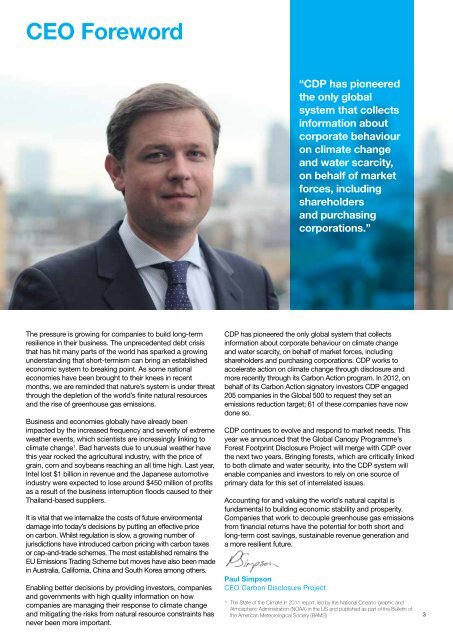CDP-FTSE-350-Climate-Change-Report-2012
CDP-FTSE-350-Climate-Change-Report-2012
CDP-FTSE-350-Climate-Change-Report-2012
Create successful ePaper yourself
Turn your PDF publications into a flip-book with our unique Google optimized e-Paper software.
CEO Foreword<br />
The pressure is growing for companies to build long-term<br />
resilience in their business. The unprecedented debt crisis<br />
that has hit many parts of the world has sparked a growing<br />
understanding that short-termism can bring an established<br />
economic system to breaking point. As some national<br />
economies have been brought to their knees in recent<br />
months, we are reminded that nature’s system is under threat<br />
through the depletion of the world’s finite natural resources<br />
and the rise of greenhouse gas emissions.<br />
Business and economies globally have already been<br />
impacted by the increased frequency and severity of extreme<br />
weather events, which scientists are increasingly linking to<br />
climate change 1 . Bad harvests due to unusual weather have<br />
this year rocked the agricultural industry, with the price of<br />
grain, corn and soybeans reaching an all time high. Last year,<br />
Intel lost $1 billion in revenue and the Japanese automotive<br />
industry were expected to lose around $450 million of profits<br />
as a result of the business interruption floods caused to their<br />
Thailand-based suppliers.<br />
It is vital that we internalize the costs of future environmental<br />
damage into today’s decisions by putting an effective price<br />
on carbon. Whilst regulation is slow, a growing number of<br />
jurisdictions have introduced carbon pricing with carbon taxes<br />
or cap-and-trade schemes. The most established remains the<br />
EU Emissions Trading Scheme but moves have also been made<br />
in Australia, California, China and South Korea among others.<br />
Enabling better decisions by providing investors, companies<br />
and governments with high quality information on how<br />
companies are managing their response to climate change<br />
and mitigating the risks from natural resource constraints has<br />
never been more important.<br />
<strong>CDP</strong> has pioneered the only global system that collects<br />
information about corporate behaviour on climate change<br />
and water scarcity, on behalf of market forces, including<br />
shareholders and purchasing corporations. <strong>CDP</strong> works to<br />
accelerate action on climate change through disclosure and<br />
more recently through its Carbon Action program. In <strong>2012</strong>, on<br />
behalf of its Carbon Action signatory investors <strong>CDP</strong> engaged<br />
205 companies in the Global 500 to request they set an<br />
emissions reduction target; 61 of these companies have now<br />
done so.<br />
<strong>CDP</strong> continues to evolve and respond to market needs. This<br />
year we announced that the Global Canopy Programme’s<br />
Forest Footprint Disclosure Project will merge with <strong>CDP</strong> over<br />
the next two years. Bringing forests, which are critically linked<br />
to both climate and water security, into the <strong>CDP</strong> system will<br />
enable companies and investors to rely on one source of<br />
primary data for this set of interrelated issues.<br />
Accounting for and valuing the world’s natural capital is<br />
fundamental to building economic stability and prosperity.<br />
Companies that work to decouple greenhouse gas emissions<br />
from financial returns have the potential for both short and<br />
long-term cost savings, sustainable revenue generation and<br />
a more resilient future.<br />
Paul Simpson<br />
CEO Carbon Disclosure Project<br />
“<strong>CDP</strong> has pioneered<br />
the only global<br />
system that collects<br />
information about<br />
corporate behaviour<br />
on climate change<br />
and water scarcity,<br />
on behalf of market<br />
forces, including<br />
shareholders<br />
and purchasing<br />
corporations.”<br />
1: The State of the <strong>Climate</strong> in 2011 report, led by the National Oceano-graphic and<br />
Atmospheric Administration (NOAA) in the US and published as part of the Bulletin of<br />
the American Meteorological Society (BAMS)<br />
3


